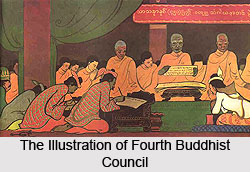 Two councils, often referred to as Fourth Buddhist Council were held. The first one was held in the 1st century B.C., in Sri Lanka. In this fourth Buddhist council, the Treravadin Pali Canon was for the first time devoted to writing on palm leaves. The second one was held by the Sarvastivada school, in Kashmir, approximately in the 1st century A.D.
Two councils, often referred to as Fourth Buddhist Council were held. The first one was held in the 1st century B.C., in Sri Lanka. In this fourth Buddhist council, the Treravadin Pali Canon was for the first time devoted to writing on palm leaves. The second one was held by the Sarvastivada school, in Kashmir, approximately in the 1st century A.D.
The second Fourth Buddhist Council (Sarvastivada tradition) is believed to have been summoned by the Kushana emperor Kanishka, possibly around 100 CE at Jalandhar or in Kashmir. The Fourth Council of Kashmir is not distinguished as classical in Theravada tradition; reports of this council can be found in scriptures which were preserved in the Mahayana tradition. The Mahayana tradition based some of its scriptures on (refutations of) the Sarvastivadin Abhidharma texts, which were arranged at this council.
It is alleged that for the Fourth Council of Kashmir, Kanishka had assembled 500 monks headed by Vasumitra, partially, it appears, to amass extensive commentaries on the Sarvastivadin Abhidharma Though it is probable that some editorial work was carried out upon the existing canon itself. The key fruit of this Council was the vast commentary known as the Maha-Vibhasha ("Great Exegesis"), an all-encompassing compendium and reference work on a portion of the Sarv?stiv?din Abhidharma.









